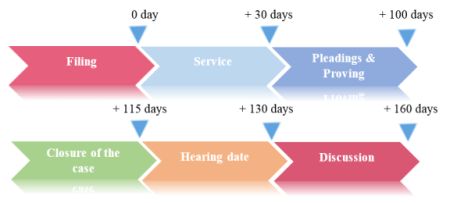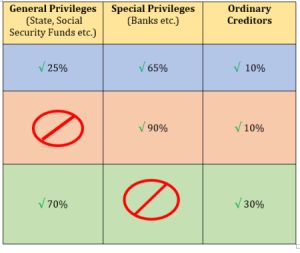Important amendments to the provisions of the Greek Code of Civil Procedure will come into effect from 01.01.2016 onwards by virtue of Law 4335/2015. The principal objective of the aforementioned law is the re – establishment of a faster, more effective and fair procedure before the Civil Courts. A brief presentation of the most important changes related to the court proceedings and the compulsory enforcement procedure follows right below.
(a) As regards the general provisions of the Code of Civil Procedure related to the ordinary proceedings and in the context of the intended accelerated process of administration of judicial cases, the oral debate on the hearing date provided for by the Code of Civil Procedure, now in force, is abolished and replaced by a written procedure. The main rule is that witnesses shall no longer be examined on the hearing date. In the exceptional case that the Court considers that the case has not been sufficiently clear so as to proceed to the issuance of the decision and considers that there is special reason for the examination of witnesses, the Court may issue an act for summoning witnesses. In this case, the examination of the witnesses takes place after the hearing date, but within the same judicial year.
Moreover, starting from the date of exercise of the lawsuit the following deadlines are set, within which the foreseen procedures shall be concluded.

(b) Several provisions of the Code of Civil Procedure related to the interim measures procedure and payment orders are also amended by Law 4335/2015. In particular, in case any interim measures have been ordered by the Court before the filing of the main lawsuit, the general rule is that the applicant is not obliged to file the main lawsuit within a certain deadline. However, the said Court, at its discretion, is entitled to determine a deadline for the filing of the main lawsuit, which cannot be less than thirty (30) days. In case the said deadline lapses unused and provided that the applicant has not serviced a payment order in the meantime, the interim measure is lifted automatically. Exceptionally, in case of temporarily adjudication of a claim, the main lawsuit must be filed within sixty (60) days from the service of the relevant judgement, otherwise the interim measure is automatically lifted. Moreover, the enforcement of a payment order issued against foreign residents or persons with unknown residence is suspended throughout the deadline of lodging a petition for its annulment. However, in the meantime, interim measures can be ordered. In case of absence of the person, who lodged the petition for the annulment of the payment order, the said petition is rejected.
(c) Important changes were also affected to the Code of Civil Procedure with regard to the compulsory enforcement law. According to the provisions of Law 4335/2015, the ability of the debtor to challenge the compulsory enforcement actions, which are carried out by the creditor, are significantly restricted. In particular, by virtue of the provisions of the Code of Civil Procedure, as in force today, the debtor is entitled to challenge separately each compulsory enforcement action and as a result the completion of the enforcement procedure is significantly delayed. However, by virtue of Law 4335/2015 the debtor is entitled to opposite to defects of the compulsory enforcement procedure in just two stages: the first one is set before the auction and is related to any reason of invalidity of the compulsory enforcement actions carried out before the auction, whereas the second one is set after the auction and is related to any defects, which arose from the auction until the awarding. In case that the compulsory enforcement procedure is based on a court's judgement or payment order, the litigant parties are only entitled to file an appeal issued against the judgement, which has been issued in relation to the annulment petition.
Furthermore, the amendments related to the classification of creditors at the distribution price of the auction, which must take place within a deadline of eight (8) months from the date when the seizure has been imposed or within a deadline of three (3) months since the continuation statement (in case the auction does not take place on the initial date) are of significant importance as well. Specifically, the proceeds are allocated for the satisfaction of the creditors enjoying general privileges, namely (in the following ranking order):
- Medical and funeral expenses of the debtor and his family that arose within the last twelve (12) months prior to the day of the public auction or the declaration of bankruptcy and compensation claims (except moral damages) due to physical disability exceeding eighty percent (80%) or more that arose until the day of the public auction or the declaration of bankruptcy.
- Expenses for the necessary food of the debtor and his family that arose during the last six months before the day of the public auction or the declaration of bankruptcy.
- Employee salaries, educator claims and lawyers' fees and expenses that arose within the last two years prior to the day of the first public auction or the declaration of bankruptcy. However, there is no limit set for claims raised by employees and lawyers for compensation due by reason of termination. The same rank also includes claims of the Stare arising out of the Value Added Tax (VAT) and any attributable or withholding taxes together with any increments and interests imposed on such claims, as well as claims of social security funds, alimony claims in case of the debtor's death and compensation claims due to disability exceeding sixty seven percent (67%) which arose up to the day of the public auction or the declaration of bankruptcy.
- Claims of farmers from the sale of agricultural products, that arose within the last year prior to the day of the public auction or the declaration of bankruptcy.
- Claims of the State and municipalities arising out of any cause, together with any increments and interests imposed on such claims.
- Claims of the Compensation Fund for investment services firms, insofar as the debtor was an investment services firm and the claims of such fund were born within the two (2) years preceding the day of the public auction or the declaration of bankruptcy.
Additionally, in case of concurrence of general and special privileges (i.e. a mortgage or a pledge) and non – privileged claims, the percentage of satisfaction of the creditors with general privileges is limited to twenty five percent (25%), whereas the percentage of satisfaction of creditors with special privileges is broadened to sixty five percent (65%). The remaining amount of ten percent (10%) of the distribution price of the auction is fortified to the non – Privileged creditors. In case of concurrence of privileged and non – privileged creditors, an amount of ten percent (10%) of the distribution price of the auction is fortified to the latter. In case of concurrence of claims with general privileges and non – privileged claims, the percentage of satisfaction of the former is seventy percent (70%). In short, the percentages of satisfaction of the creditors are the following:

It should be also mentioned that the security bond necessary for the submission of tenders is limited to thirty percent (30%) of the starting price (instead of 100% as in force today). Generally, Law 4335/2015 simplifies the compulsory enforcement procedure related to real estate and movable property. Inter alia (e.g. enforcement seizure can be imposed on real property, that has already been seized by another creditor, public declaration of the auction is abolished), the starting price for real estate is equated to the market value, which shall be specified according to the provisions of a presidential decree, which will be issued until 01.06.2016. Until then, the estimation of the market value shall not be lower than the real value of the real estate, as estimated when the seizure took place. Furthermore, the highest bidder is entitled to terminate any lease agreement within one (1) month from transfer of the adjudicative report to the land registry and in case of a commercial lease agreement the higher bidder is not any more obliged to compensate the lessee. Two (2) months upon termination, the lease agreement is cancelled.
It remains to be proved in practice whether or not the intended aim of Law 4335/2015, namely the establishment of a faster and at the same time fair procedure before the Civil Courts, will be actually achieved.
The content of this article is intended to provide a general guide to the subject matter. Specialist advice should be sought about your specific circumstances.


